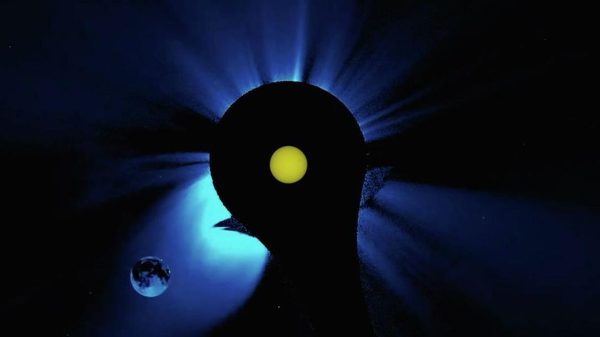A quarter of a century after he founded Amazon in a Seattle garage, Jeff Bezos announced this week that he is preparing to loosen his grip on the $1.7tn (£1.2tn) company. The billionaire – who until he was recently overtaken by Tesla’s Elon Musk was the world’s richest person – will this summer pass the reins to top lieutenant Andy Jassy and Bezos will become executive chairman.
Few employees in the sphere conservatories at Amazon’s sprawling Seattle campus headquarters reckon Bezos will relinquish much of his iron grip on the company’s day-to-day decision making. But Bezos, 57, told his 1.3 million employees (who he refers to as “fellow Amazonians”) that “as much as I still tap dance into the office, I’m excited about this transition”.
“I’ve never had more energy, and this isn’t about retiring,” he said. “I intend to focus my energies and attention on new products and early initiatives … I’m super passionate about the impact I think these organisations can have.” Those organisations were: the Day One Fund; the Blue Origin space company; the Bezos Earth Fund; and the Washington Post newspaper.
Here we look at what Bezos will do next with those interests.
Day One Fund
Bezos is unique among the world’s five wealthiest people as the only one not to have signed the Giving Pledge, a philanthropic initiative created by Bill Gates and investor Warren Buffett to encourage the world’s richest people to commit to giving at least half their wealth to charity.
In 2018 he gave $2bn, amounting to just over 1% of his wealth, to the Bezos Day One Fund to help address homelessness and improve education for children in low-income families.
Bezos said his decision to use the fund to support nonprofits that focus on homeless services was inspired by Mary’s Place, a Seattle-based organisation with a simple motto: “No child sleeps outside.”
However, the charity has been criticised for only slowly ramping up its donations to good causes. Earlier this year it named 42 recipients from 24 states that will receive donations totalling $106m.
Blue Origin
When attending high school near Miami, Bezos decided he wanted to go into space when he grew up. But, his ambition was not to be an astronaut; he wanted to colonise space.
He was named valedictorian of his high school class and when he graduated in 1982, the Miami Herald asked for an interview. The 18-year-old Bezos told the paper he wanted to “build space hotels, amusement parks and colonies for 2 million or 3 million people who would be in orbit”.
“The whole idea is to preserve the Earth,” he told the paper. “The goal was to be able to evacuate humans. The planet would become a park.”
Now, Bezos owns Blue Origin a space company that aims to make space travel cheaper and slightly more accessible with reusable launch vehicles. The company, which uses the motto Gradatim Ferociter, Latin for “step by step, ferociously”, is testing a moon lander called Blue Moon and hopes to launch its first mission in 2024.
In his race to commercialise space Bezos is competing against Musk’s SpaceX.
Bezos Earth Fund
Last year Bezos posted a picture of the Earth on Instagram, and announced the creation of his new project the Bezos Earth Fund, a $10bn initiative to support scientists, activists and charities working to tackle the climate crisis.
“Climate change is the biggest threat to our planet,” he said. “I want to work alongside others both to amplify known ways and to explore new ways of fighting the devastating impact of climate change on this planet we all share. This global initiative will fund scientists, activists, NGOs – any effort that offers a real possibility to help preserve and protect the natural world. We can save Earth. It’s going to take collective action from big companies, small companies, nation states, global organisations, and individuals. Earth is the one thing we all have in common – let’s protect it, together.”
In November he announced 16 initial recipients of the fund, who will receive a collective $791m. They include The Nature Conservancy, Natural Resources Defense Council, Environmental Defense Fund, World Resources Institute and the World Wildlife Fund, which will each receive $100 million.
Bezos said, again on Instagram, that he had spent months learning about the grantees’ work and said they were all “working on innovative, ambitious and needle-moving solutions”. It is “just the beginning”, he added.
The Washington Post
Bezos bought the Washington Post, famed the world over for its Watergate investigation that led to the resignation of President Nixon, in 2013 for $250m.
He has been credited with bringing the paper into the digital era after decades of decline and concern about its future as a going concern. The Post was given prominent position on Amazon devices such as the Kindle.
Reporters and editors who might have feared that Bezos would interfere with editorial decision-making, say that the billionaire has focused on the technology side of the business and has not used it to promote his own agenda.
“I didn’t know anything about the newspaper business … But I did know something about the internet,” Bezos said in an interview soon after he took over.
… and still at Amazon
Those 1.3 million Amazonians should not think they’ve seen the last of their boss. Amazon’s chief financial officer Brian Olsavsky told reporters last night that: “Jeff is really not going anywhere. It’s more of a restructuring of who’s doing what.”






















































Свежие комментарии